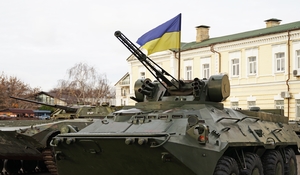The Surprisingly Unsurprising Russo-Ukraine War: Learning and Teaching the Right Lessons for Integrated Deterrence

Speaker(s): Roberson, P. (Commander and Commandant, US Army John F. Kennedy Special Warfare Center and School, Fort Bragg); Meredith, S. (National Defense University); Eltsov, P. (National Defense University); Davidson, C. (National Defense University)
Date: 5 April 2022
Speaker Session Summary
SMA hosted a speaker session with Dr. Spencer Meredith (National Defense University), Dr. Peter Eltsov (National Defense University), Prof. Carolyne Davidson (National Defense University), and Maj. Gen. Patrick B. Roberson (Commander and Commandant, US Army John F. Kennedy Special Warfare Center and School, Fort Bragg) as part of its SMA EUCOM Speaker Series.
Traditional military intelligence effectively identifies an actor’s ongoing activities; however, it often misses the context surrounding why an actor chose to take certain actions and those actions’ subsequent consequences. Academia aims to fill this knowledge gap, according to Dr. Eltsov, as scholars offer explanations regarding actors’ rationale and why certain outcomes occur. Dr. Meredith commented that social sciences, like political science, can explain why certain social or military actions—such as Russia’s invasion of Ukraine—failed while similar instances throughout history were successful. Prof. Davidson added onto this observation, stating that Ukraine’s resistance to Russia could have been predicted if the US looked at Ukraine and other countries in the region with more strategic empathy. Also, the US will be able to better predict the outcome of future conflicts if it implements a global strategy for future deterrence.
Dr. Eltsov linked Ukraine’s military resilience and social willingness to resist Russia’s invasion to a strengthening of Ukrainian national identity. He attributed Russia’s miscalculation of Ukraine’s resilience to its assumption that many Ukrainians view themselves as Russian because Russian is the dominant language in much of Ukraine. He added that Russia’s current withdrawal from Kiev is also undermining Putin’s desired narrative as the leader of a nation with a modern and powerful military. MG Roberson identified military support and training from the United States and other Western countries prior to Russia’s invasion as a key contributing factor in Ukraine’s success. The presenters acknowledged that the defense capabilities of smaller countries may prove to be effective in deterring authoritarian and aggressive countries, like Russia and China, in the future, since these smaller countries can look to Ukraine’s success for inspiration.
Comments